Sadder Things
this latest season of the beloved show exemplifies how flawed it has always been
Here on Planet Nerd, where the kind of people dramatized on Stranger Things hold a position of utter dominance over our popular culture, it feels genuinely subversive to say: I don’t like Stranger Things. Not anymore, I guess. For the record I spent the first three seasons kind of skating along on the edge of liking and not liking it, consistently pulled over into liking it by the obvious love with which it’s made and its excellent casting and performances. It’s also that rare big-budget TV show that, unlike the Star Wars and MCU shows, never looks cheap despite those big budgets. But this past season pulled me all the way over into hateration, despite the show’s heart. Or maybe that’s the problem: all it has is heart, and that’s not enough. (Spoilers throughout.)
The biggest gripe: in drama, every scene cannot be climax. The Duffer Brothers are absolutely indifferent toward the basic concept of dramatic rise and fall, of balancing intensity with quieter moments. The last couple episodes of this season were just relentlessly heightened, attempting to make scene after scene a special scene. When Will (more or less) comes out to Mike, it’s a special scene, and when he (more or less) comes out to his brother, it’s a special scene. It’s a special scene when Eleven fails to forgive Papa. It’s a special scene when Lucas confronts that angry boyfriend dude and the white rage he so artlessly represents. It’s a special scene when Max admits to wishing for Billy to die. It’s a special scene when Lucas wordlessly asks out Max. It’s a special scene when Steve describes his ideal future life. It’s a special scene when Mike tells Eleven he loves her. It’s a special scene when Hopper and Joyce reconnect. It’s a special scene when the characters mourn the dead-not dead Max. It’s a special scene when Hopper and Eleven reunite. It’s a special scene when Eleven saves Max. It’s a special scene when Eddie dies. It’s a special scene when the gang gets back together. You know what the effect of all of this is? Nothing. Nothing at all. Because if you’re dramatically heightened all the time, you’re never actually achieving heightened effect. Your audience becomes numb to all of it. Drama has been created with rising and falling actions for millennia for a reason! At some point you have to have a regular portion of your show. Just, like, normal show stuff. Especially when the season is 20 hours long. It’s like if every episode of an entire season of Full House was a Very Special Episode. It’s exhausting.
The biggest narrative problem with the show is that Eleven is too powerful and ultimately solves every problem, reducing the stakes and drama. So this season they… expanded her powers to include literally resurrecting the dead. It’s the exact same issue with the Jedi in contemporary Star Wars: if there are no consistent limitations to a given character’s supernatural powers, you can simply invent new ones to write your way out of any story problem you run into. The only trouble is that, with no rules, there are no stakes, and you break the implicit compact between the audience and the creator. You’re abusing your privileges as a creator of fiction. You’re saying “forget consistency, forget basic sense-making, this character will do whatever I want them to do whenever I want them to do it.” Hey, you want spoilers for season five? When all hope is lost, Eleven will summon new reserves of power and save the day. There you go.
I have already written about my great annoyance at the tendency (found in far more places than just Stranger Things) to references that exist only for the sake of referencing. For example, in the last episode of this past season, Dustin is dressed in the costume of a character from Red Dawn. This is absolutely classic for this show: there is no meaning whatsoever to this reference other than that Red Dawn is a product of the 1980s and some small portion of the show’s audience will see it and say “hey, it’s Thing! I remember Thing!” That’s it. There’s nothing deeper or more meaningful there. Symbolism only has value if there is some deeper dramatic reason for that symbol to be invoked. Otherwise it’s just “remember Thing?!?” As a bonus, there isn’t even any in-narrative reason why Dustin would be wearing camouflage (a fucking ghillie suit) at all.
Speaking of, how many “gearing up” montages does one show need? How many times are we going to see the gang assemble their weapons and put on their outfits and get ready for the big fight in this show? It’s one of the most aggravating aspects of the whole enterprise: once the Duffer Brothers find a beat they like, they run with it over and over again, season after season. You can only ring the same bell so many times.
The nerd pandering… good god, the pandering. The whole enterprise is a collective blowjob for people who didn’t enjoy high school and never got over it. In this last episode Lucas straight-up says that popular people are bad and nerds are good. Hey, Duffer Brothers: I’m sorry if your adolescence was unhappy, but some popular people are good people and some nerds are bad people. That’s reality.
The obvious rejoinder to the above is Steve Harrington, the show’s most beloved character. And Steve’s unexpected face turn in the first couple seasons was a genuine delight, an unexpected redemption arc for a popular kid in a nerd-service show. But Steve is the perfect example of how Stranger Things never knows when enough is enough. Steve can’t just be an unexpectedly cool guy; he’s gotta be a perfect angelic kindhearted courageous sweet down-to-earth humble symbol of perfection. With each new episode the show’s writers layer on more and more laurels for the impossibly virtuous Steve Harrington. I can’t enjoy the character anymore because he’s so cartoonishly good. There’s no complexity. There’s just good old Steve, doing the right thing.
And the problem there is that the Stranger Things crew clearly pays much, much too much attention to the internet. This is a widespread plague in our present culture, this obsession with catering to the “hardcore fans.” The best art you’ve ever enjoyed was made with a studied indifference to its audience. One of the things I hate most about modern TV and movies is recognizing the moments where the creators said “oh, people are definitely gonna gif this part!” It’s bad form for shows to constantly put out their lips to be kissed.
Here is where I must mention “Justice for Barb,” one of the worst things to happen in the history of pop culture. In the first season a minor character was killed off to fulfill a narrative purpose. This is, I would like to point out, an absolutely routine element (an absolutely necessary element) of storytelling. Some characters exist to die. But because the internet is filled with entitled people who have been raised to believe that every impulse that crosses their mind is valid, some excitable types started a “movement” demanding “justice” for this plot device named Barb. (Fun fact: there is no such thing as real-world justice for imaginary characters.) It was completely senseless and precisely the sort of thing that a disciplined creator would know not to pander to. Instead, the show leaned hard into that exact pandering, and we got a season-long arc of pretending to give a shit about Barb, a character pretty much defined by a pair of glasses. I can’t wait for us to get a “Justice for the Guy Who Gets Eaten By a Raptor in the First Five Minutes of Jurassic Park” movement so that one of these soulless media conglomerates can shit out some more fan service.
Here’s Bob, a briefly-beloved character who exists only to die and provide a dramatic moment. Here’s Alexei, a briefly-beloved character who exists only to die and provide a dramatic moment. Here’s Eddie, a briefly-beloved character who exists only to die and provide a dramatic moment. They’re like redshirts from Star Trek and their deaths are always stuffed with more implied emotional importance than the audience can actually feel about such a briefly-encountered character.
This season’s half-hearted stabs at political symbolism are too embarrassing to mention.
Dustin is a profoundly annoying character. Mike is a profoundly annoying character. Erica is a profoundly annoying character. Murray is a profoundly annoying character. Argyle is a profoundly annoying character. The Russian scammer Yuri is a profoundly annoying character. Dustin’s Utah girlfriend Suzie is an impossibly annoying character.
Why does everyone dress like such a fucking asshole on this show? Yes, 80s fashions often appear ugly to modern eyes. But they’re clearly trying to make the characters look extra awful, for no discernible thematic reason. Not everyone was walking around looking like absolute ass for the entire decade of the 1980s, I promise you. Mike dresses like his only clothes came from a bag he stole from one of those Salvation Army bins. Will’s hair, I swear to God, it’s like the show’s creators said “give this child the most dogshit haircut you’ve ever seen.” Why? What is being added here? It’s like Kyrsten Sinema was in charge of costume design. There are times when the Duffer Brothers appear to be trying to do some sort of heightened reality/80s grotesque thing, but they never quite go through with it and don’t commit to anything. It’s just one of many stylistic decisions that they appear not to particularly care about. This is child abuse:
In early seasons there are times that Mike is presented almost as the protagonist of the show. He’s the leader of his little gang and the guy who gets the girl. And he stomps around his scenes, scowling and acting like he’s better than everyone else. Here’s my challenge: tell me a single time Mike has ever done anything of value. Seriously. What is that haughty shithead bringing to the table? This would be fine if the show seemed to know that Mike is a useless bundle of sticks, but he’s portrayed as a figure worthy of admiration. He’s also too cool for Dungeons & Dragons now but dresses like he’s going to a theme party every day of his life.
Sublety is not the only or highest virtue in art. But subtlety is an important tool. A common critical complaint about nerd culture relics is a lack of character moments, but you can’t fault Stranger Things for that. Characters are constantly having heart-to-hearts or making melodramatic confessions. The problem is that you’re hit over the head with this stuff so hard it kills any sense of realism or nuance. Often this is telegraphed with extremely heavy-handed music choices. The actors always put on their pained faces. There’s a lot of deliberate shuffling towards a greater intimacy and understanding of each other. Any individual such scene would be fine. But Stranger Things seems to pack a half-dozen such scenes into every episode, and again we have the numbing effect of repetition and melodrama. If they just dialed back the “you’re supposed to feel feelings now, audience” stuff, it would all add up to something so much more affecting. But the show just never trusts its audience or itself, never. And so every feeling is hammered home and every character development is telegraphed. HEY DID YOU NOTICE NANCY AND STEVE ARE FLIRTING AGAIN? HEY DID YOU NOTICE JOYCE AND HOPPER ARE SWEET ON EACH OTHER? HEY LET’S HAVE WILL LISTEN TO DIANA ROSS’S “I’M COMING OUT” ON HIS WALKMAN OVER AND OVER AGAIN BUT LET’S MILK THIS FOR ONE MORE SEASON BEFORE HE FINALLY UTTERS THE WORDS “I’M GAY.”
So look at Hopper. Hopper spends most of this past season in a Russian military prison - not a gulag, read a book - and doesn’t have a ton to do beyond acting tough and knowing. But we’re given some more of his dark backstory. Hopper is Grappling with Demons. This is due to his daughter dying of cancer, plus also he was in Vietnam? Anyway, he’s got some skeletons in the closet, is the idea. Which is fine. But his little speech about how being in a Russian prison gave him time to think about who he was and the bad things he’s done…. Like, what, being a wise, courageous, self-sacrificing hero, which we’ve seen for the three previous seasons? I’m not saying that all of his demons should have been exorcised in a few years being the good guy and a father to Eleven. But there’s just no connection between what Hopper’s talking about and anything that’s dramatized on screen in this season. It comes out of nowhere. The show had already laboriously explored the effect of his daughter’s death in the first season, but at least there it was connected to the broader narrative. Here, Hopper’s speech seems to exist primarily because he just didn’t have much to do this season and they needed to give David Harbour some dramatic dialogue.
Hey, did you know it’s the 80s? You’ll fucking know for sure by the time this show is done with you! For example, in the second season they show “Reagan/Bush ‘84” yard signs like literally 10 times. They are so scared you’ll forget that it’s the 80s! I GET IT, IT’S THE EIGHTIES, THANK YOU.
“There just happens to be the sword from Excalibur in a Soviet military prison because that’s cool” is what you say when you know you have an audience of captive rubes who will rabidly attack anyone who dares criticize their special thing.
Oh my god, the color grading. Why is everything blue in like a third of the scenes? Why is everything orange in like a third of the scenes? OK, the (sigh) “Upside Down” is all grey and shit because it’s some sort of alternative dimension that’s like a dark mirror of Earth. (Except when it isn’t because there’s no remotely coherent rules for that in the show. I digress.) But can scenes that take place in the real world show us some colors that actually exist on planet Earth, please?
This show is so thirsty for credit for its gay characters. How many times are they going to tease that Will is gay without just coming out and saying it? Ah, but the more you tease, the more sad obsessives can create gifs to share on Tumblr! If a character is gay, let them be gay without so much ceremony. It’s 2022. Just having LGBTQ characters should not get you an Emmy anymore. You’re making nostalgia porn for people who spend the rent money on FunkoPop, not throwing bricks at Stonewall. Look at the famous coming out scene between Robin and Steve. Here’s an emotionally honest version of that scene that doesn’t beg for credit: “Steve, this is really hard for me to say, but… I’m gay.” There. Character out. Representation served. What did they do instead? Have this utterly bizarre pretense that Robin was obsessed with Steve, leading Steve to think she’s in love with him, only then to reveal that Robin was obsessed with him because the girl Robin loved was obsessed with Steve. To which I say… what? What the fuck? It doesn’t work that way! There’s no transitive property of obsession! I was in love with plenty of girls in high school without ever accidentally becoming obsessed with their boyfriends. Why go through this absurd charade? Because the show needs a reversal, you see, a twist. And why do they need a twist? Because the show doesn’t really want to have gay characters, not in and of itself; it wants to get credit online for having gay characters. The little peek-a-boo makes Robin coming out a gimmick. It’s praise-begging, look-at-me screenwriting.
Nothing in the show feels properly motivated. There’s this old screenwriting concept that everything that happens in a story should be either because of or in contrast to what preceded it. Trey Parker and Matt Stone (of all people) put this simply: therefore or but. It’s not a hard and fast rule, of course, but you want to feel like there’s dueling senses of inevitability and surprise in your narrative. Nothing surprises me in Stranger Things because it feels like anything can happen, and not in a good way. Every plot point seems random and not particularly logically connected to what came before. Our team of heroes is forever coming up with plans that are based on wild assumptions they have no reason to believe and make no sense. The rules of the universe are arbitrary and fickle. Hey, the big bad is actually a guy who was in Eleven’s superpower program! And, uh, he was also a child in the 60s who lived in a haunted house but it turns out he was the ghost, I guess. Now maybe let’s wedge that storyline into our preexisting understanding of the Upside Down and Eleven’s powers in an almost transcendently awkward way? Sure. Why not. That’s the show’s guiding ethos for its narrative developments: why not? Why not have Joyce and Murray mount a rescue mission for Hopper that’s absurd even by the standards of the show? Why not have a kung fu fight on a plane operating without a pilot? Why not have Max give that tearful confession about wanting Billy to die for no discernible reason other than manufactured pathos? Why not make Murray the delusional and mercenary conspiracy theorist also James Bond with a heart of gold for no reason? Why not have competing elements of the military whose basic relationships and intentions are not remotely explained? Why not have the smoke monster from Lost behind glass in the Soviet Union just because? Why not have a spaced-out pothead character get crammed into the show to deliver Cheech & Chong-level stoner humor at every possible opportunity? Why not have the characters once again give a villain a name from their Dungeons & Dragons game that will then inexplicably be treated as its canonical title? Why not explicitly introduce the question of whether a small Russian helicopter can safely transport five people thousands of miles, only to then completely ignore that question when the time comes? Why not have Eleven once again become more powerful because she realized the power of love or whatever the fuck? Why not lead our characters to the very edge of death yet again only to release them from it through some vague and arbitrary turnaround? Why not completely sever whatever remaining attachment the show had to keeping the fantasy world secret and hidden and have a giant mystical fault line open up in suburban Indiana in a way that would prove to be one of the biggest events in our country’s collective history if it happened in real life? Why not set up an immediate cliffhanger when your rapidly-aging cast will be years older by the time you finish the final season? Why not. Why the fuck not. The nerds will eat your slop no matter what. So why not?
Before you comment, please remember:


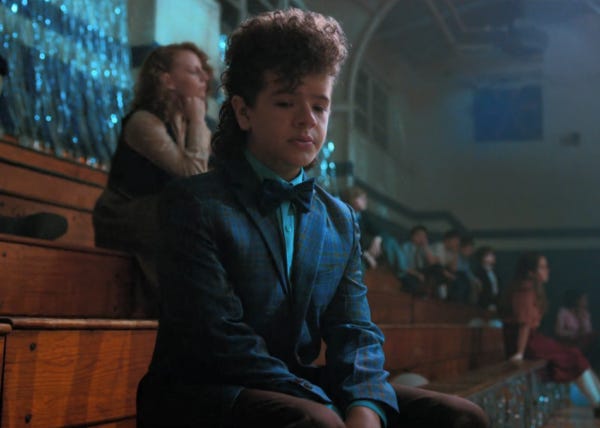
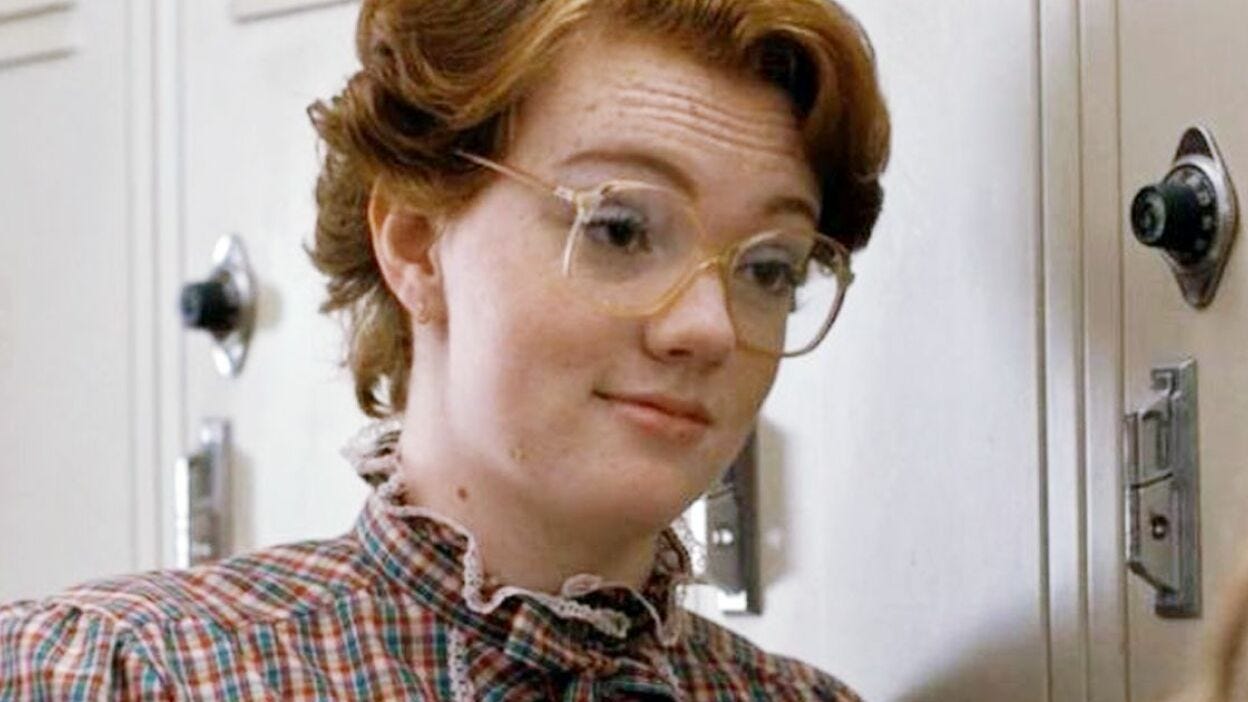
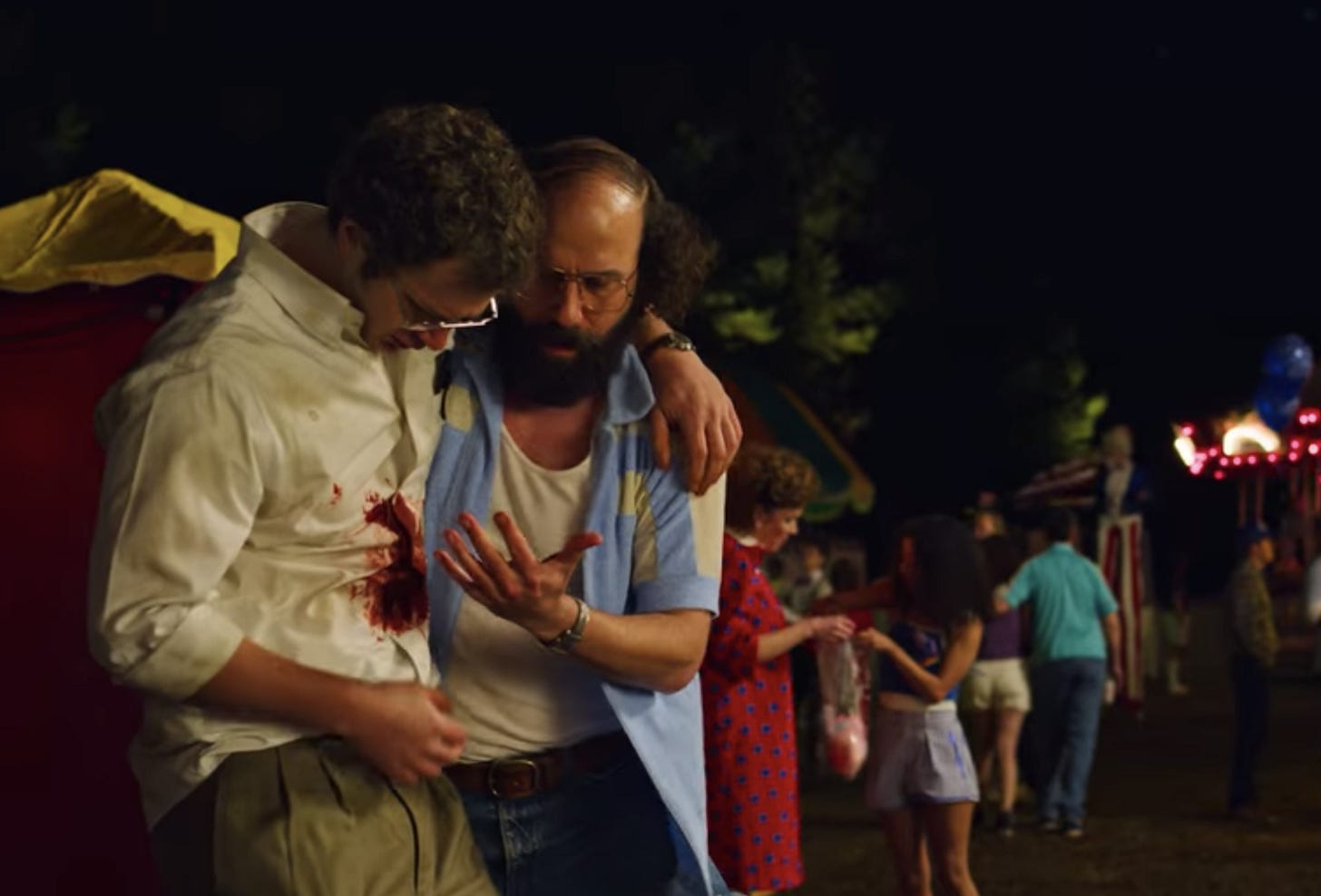
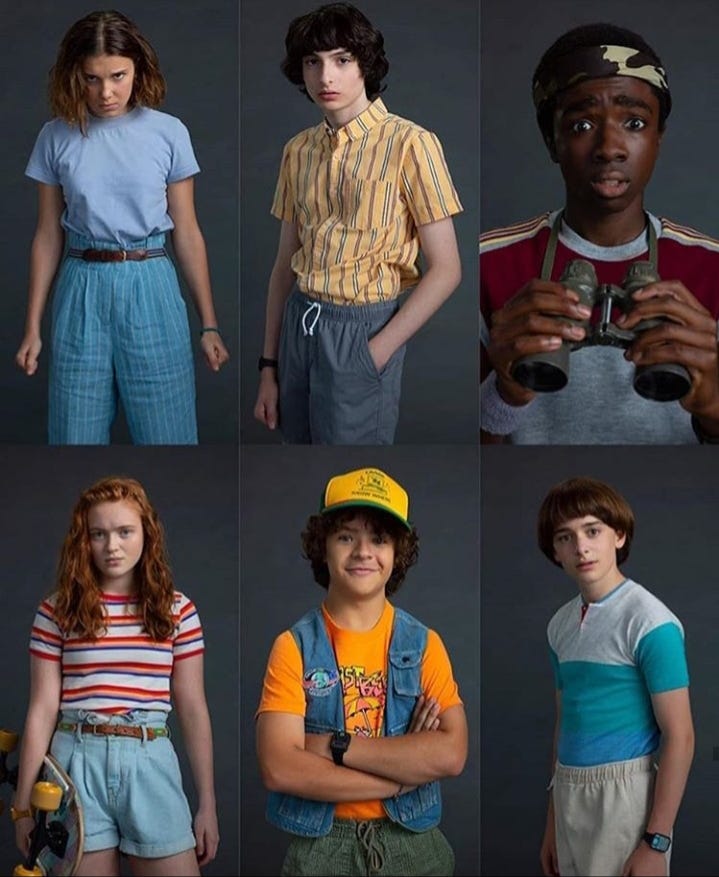
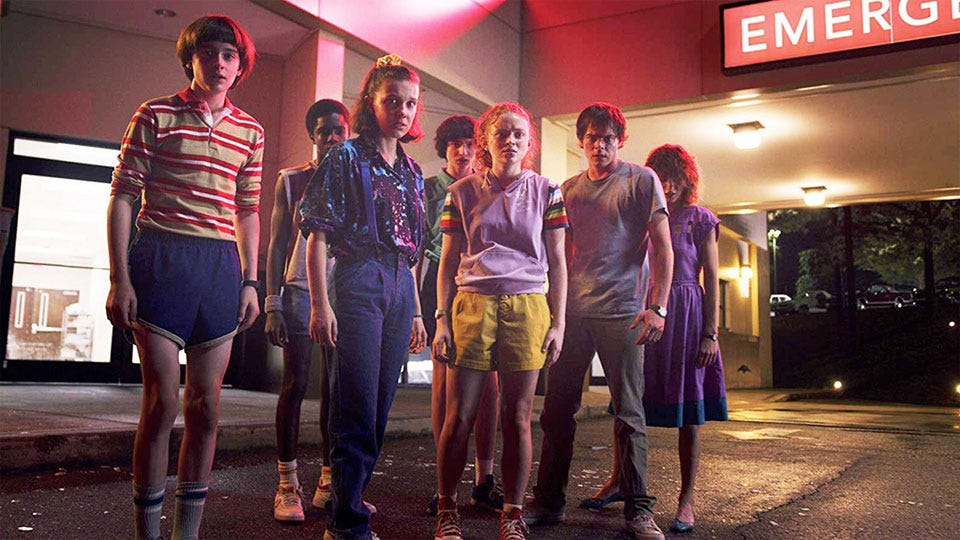
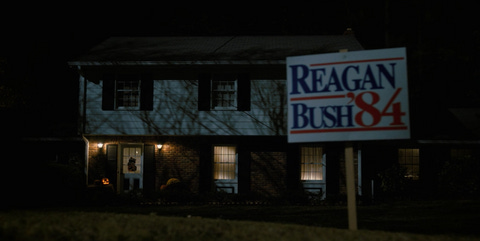
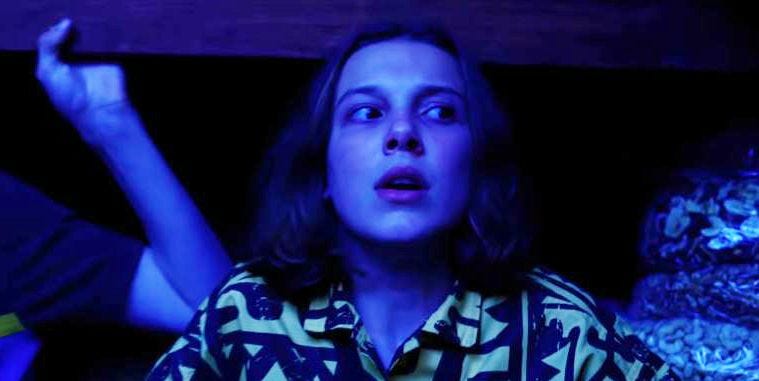
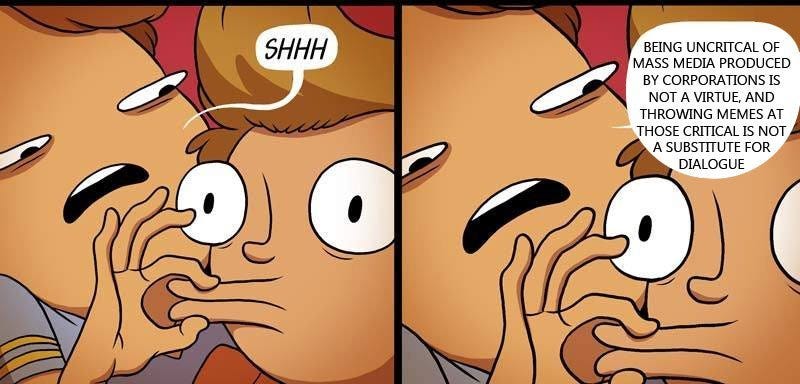
I only watched the first season and thought it was fine but not good enough to keep watching. I grew up in the 80s as a nerd who played D&D and this show just doesn't feel right to me. It feels like what a nerd who plays D&D now thinks the 80s was like. My D&D playgroup was nerds but two of us were also on the football team and one of was a complete stoner. Us nerds were programming on our C64 and Atari 800s. And we all listen to metal (lots of Iron Maiden). We also had no girls playing. They weren't playing because we excluded them but because no girl at the time was interested at all. Now maybe this was totally different for other nerds in the 80s but this show just doesn't feel right to me. I also hate nostalgia for nostalgia's sake.
Contemporary Hollywood is plagued by the lack of limits. In classic movies, the physical limitations of special effects caused for increased creativity. It led to better screenwriting. They had to think "how can make this work?"
I like the Netflix series "The Movies That Made Us" as it shows that so often the filmmakers had to just do that and how things just came together. They couldn't just CGI in some crap later to make it work.
The MCU/Marvel things are all about lack of limits. "Let's just make this next scene even bigger! Let's get Wanda even more power! Let's have a multiverse so we don't ever really kill anyone off!".
I recently showed my oldest the orginal Alien. The thing is 45 years old and looks extremely good and holds up. It is such a great movie and such quality filmmaking.